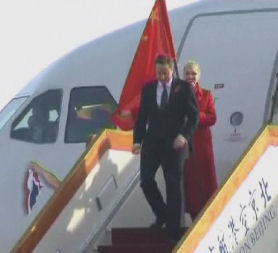Cameron to push for ‘open dialogue’ in China
As David Cameron begins his two-day visit to China, Political Editor Gary Gibbon says the Prime Minister will not threaten lucrative trade deals by “lecturing” the Chinese on human rights.
Mr Cameron has confirmed he will raise the issue of human rights when he holds trade talks with China’s leaders.
He is hoping to secure deals during his first official visit to the region which will double bilateral trade to $US100bn a year by 2015.
But Mr Cameron rejected the idea that raising the issue of human rights could threaten trade deals.
“We want a stronger business relationship with China but we will have a dialogue over human rights as we have done and as we always will do.” Prime Minister David Cameron
“We have a shared interest in expanding our exports and imports and trade with each other, but we do have a very high level of dialogue on all issues, including human rights,” Mr Cameron said.
“Of course with all countries we should have frank and open relations.

“Yes we want a stronger business relationship with China. business and trade growth but we will have a dialogue over human rights as we have done and as we always will do.”
Artist Ai Weiwei, who created the current sunflower seed installation in London’s Tate Modern as well as Beijing’s Bird’s Nest Olympic stadium, has urged Mr Cameron to press President Hu Jintao and Premier Wen Jiabao on human rights when he meets them for face-to-face talks.
Mr Cameron said he will raise the issue, but he did not confirm whether he would address specific cases.
David Cameron urged not to 'rock the boat'
A former diplomat who attended meetings between the British and Chinese leaders in the not so distant past told me that on one occasion the UK delegation simply pointed at documents on the table that were minutes from the separate "dialogue" between Chinese and British officials on human rights and said words to the effect "we know about that, of course."
There will be plenty - some of them business leaders on this trip - urging David Cameron not to rock the boat on trade for the sake of pleasing a domestic UK audience on human rights...the PM thinks trade could increase substantially over the next decade and beyond and he thinks if the Chinese think he's lecturing them they will take their business elsewhere.
Read more from Gary Gibbon on trade before human rights for David Cameron in China.
The Prime Minister said that he will also raise issues including climate change, global security, Iranian nuclear programmes, North Korea and the disputed elections in Burma.
While Mr Cameron accepted that for now, the balance of trade will remain firmly in China’s favour, he set a target of achieving $30bn worth of UK exports within the next five years.
Writing in the Wall Street Journal, he said that the trip will provide “a further step forward in UK-China relations, adding momentum to our commercial relationship and cementing an economic and political partnership that can help to deliver strong and sustainable growth and greater security for us all in the years ahead”.
But the Prime Minister insisted the relationship was “not one-way”.
“Britain has much to offer China too,” he said.
China bans lawyer from leaving
Why are the Chinese drawing more attention to their poor human rights record just as the British Prime Minister arrives in Beijing, asks Lindsey Hilsum.
Ah well. I had an interesting interview lined up for tomorrow, but it was not to be. The Chinese authorities, in their wisdom, have prevented Mo Shaoping - the lawyer for Liu Xiaobo, the Chinese dissident who won the Nobel Peace Prize – from leaving China.
He and his colleague Professor He Weifang, who was also stopped at the airport, were supposed to attend a meeting in London of the International Bar Association. The police who detained them said their leaving could be “a threat to China’s national security”.
Read more from Lindsey Hilsum on China banning a lawyer from leaving the country
As “the most open economy in Europe Britain is uniquely placed as China’s gateway to the European Union and is already home to more than 400 Chinese companies,” Mr Cameron pointed out.
“No other country can offer the same unique advantages, whether our timezone, our language, or our universities – which include six of the best in Europe and two of the top three globally,” he said.
Mr Cameron is in Beijing with Britain’s largest ever Government and business delegation to the region, including Chancellor of the Exchequer George Osborne, Business Secretary Vince Cable, Energy Secretary Chris Huhne and Education Secretary Michael Gove.
Can Cameron bring home the bacon from China, asks Economics Editor Faisal Islam.